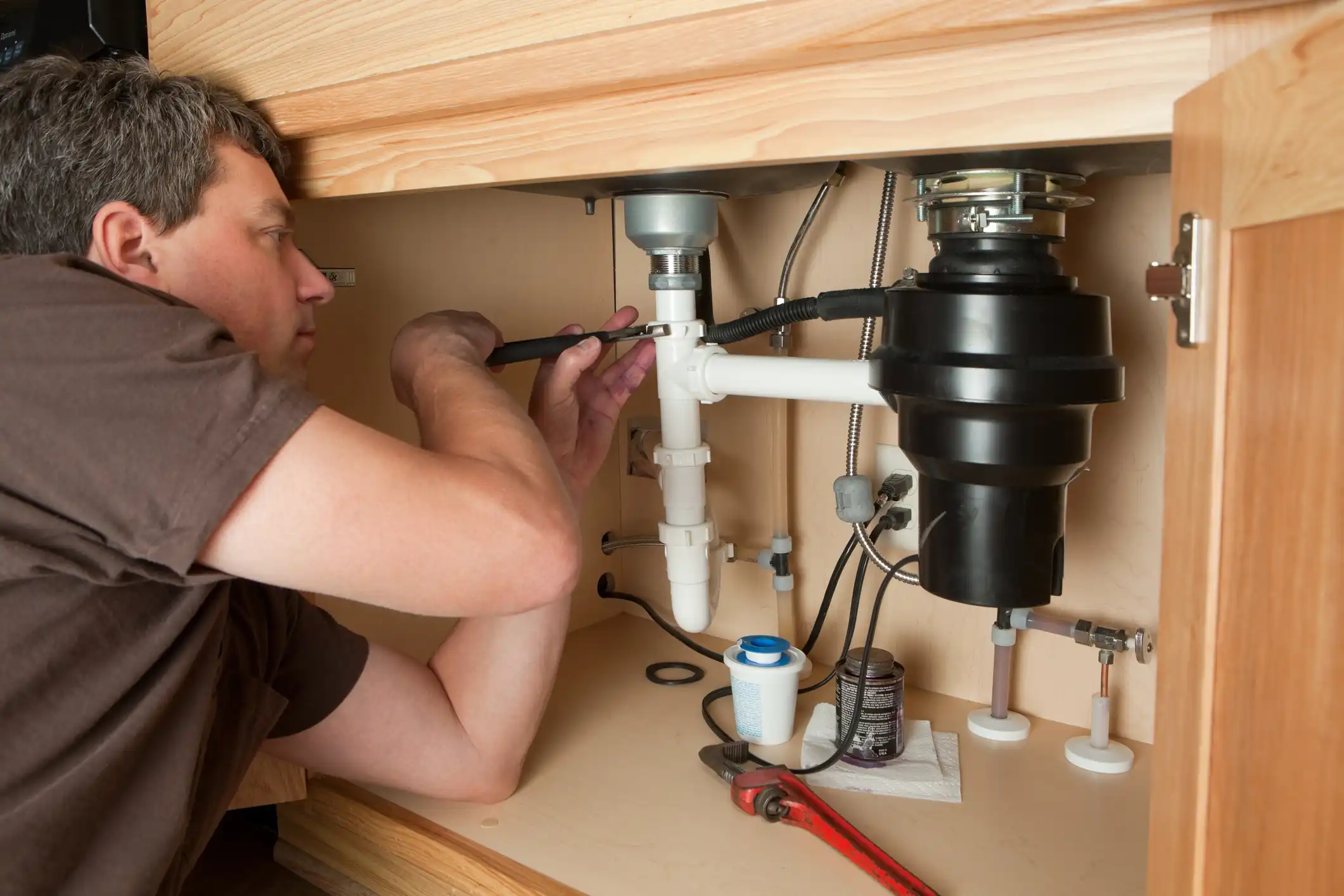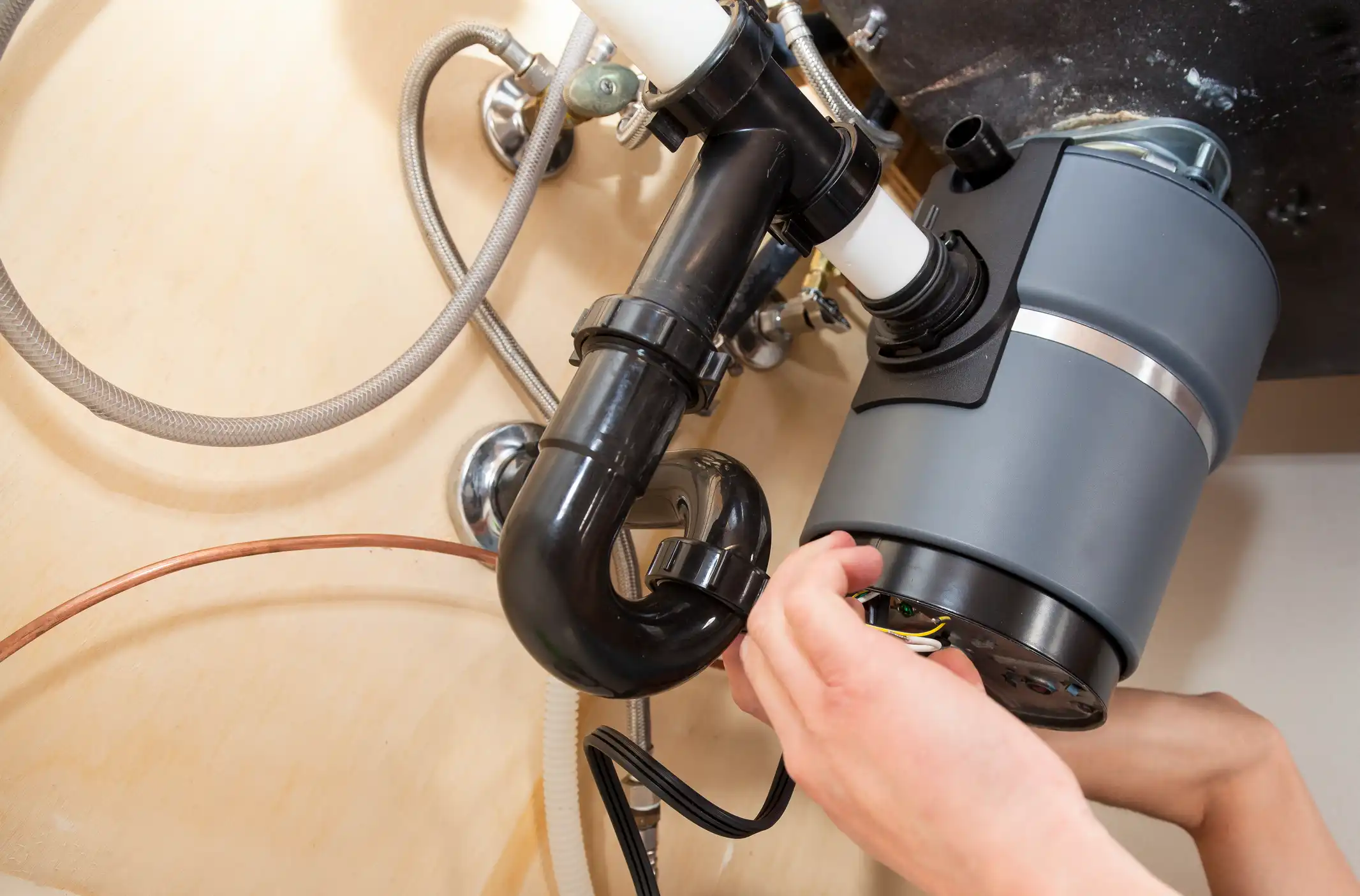Garbage Disposal Repair Goleta, CA
Serving Ventura & Sacramento Counties

A malfunctioning garbage disposal interrupts kitchen routines, creates unpleasant odors, and can lead to clogs or leaks that damage cabinets and flooring. For homes in Goleta, CA, timely garbage disposal repair protects coastal properties from moisture damage and corrosion and keeps busy households and vacation rentals operating smoothly. This page explains the common problems we see in Goleta, how repairs are diagnosed and performed, when repair makes sense versus replacement, and practical safety and maintenance advice you can use today.
Common garbage disposal issues in Goleta homes
- Jammed disposal: Stuck food, utensils, or fibrous scraps (onion skins, celery) stop the motor and cause grinding noise or no movement. Local coastal cooking—including seafood shells—can contribute to jams.
- Humming or motor not starting: Motor hums but the grinding plate does not turn. Often a jam or a failed internal component is the cause.
- Leaks under the sink: Seals, mounting flanges, drain connections, or cracks in the unit can leak water into cabinets. Coastal salt air can accelerate corrosion on metal parts and fittings.
- Slow draining or recurring clogs: Partial obstructions in the disposal or downstream drain trap will slow sink drainage and create backups.
- Electrical problems: Tripped breakers, bad switches, wiring issues, or a failed reset switch can render the unit inoperable.
- Bad odors or buildup: Residue, trapped food particles, and mineral deposits from hard water cause smells and reduce grinding performance.

How we diagnose garbage disposal problems
- Confirm the unit is powered off and locked out for safety before any inspection.
- Visual and manual inspection of the sink flange, mounting hardware, and plumbing connections.
- Attempt controlled manual rotation with an appropriate hex key tool to check for jams and confirm free movement of the grinding assembly.
- Run simple electrical tests: check reset button, outlet power, switch function, and circuit breaker.
- Inspect for leaks at the dishwasher connection, discharge tube, sink flange, and body of the unit to pinpoint the leak source.
- If needed, remove the unit for a closer look at bearings, motor condition, and internal corrosion.
Typical repairs and what they involve
Jam clearing and internal cleaning
- Remove foreign objects safely and rotate the turntable with a hex wrench to free stuck blades.
- Clean the grinding chamber to remove fibrous material and mineral buildup that causes repeat jams.
- Outcome: Restores normal operation quickly when the unit is otherwise sound.
Motor troubleshooting and repair
- Replace failed internal components when feasible or replace the motor assembly if available for that model.
- If the motor is burnt, shorted, or bearings are seized, replacement of the unit is often more reliable.
- Outcome: Repairs can extend service life when damage is limited; complete motor failure usually favors replacement.
Leak repair (flange, seal, discharge, dishwasher line)
- Tighten or replace mounting flanges and gaskets, reseal or replace discharge connections, and swap out corroded clamps.
- Replace cracked housings if leak originates from a compromised body.
- Outcome: Stopping leaks early prevents cabinet and subfloor damage common in coastal homes.
Electrical troubleshooting
- Replace faulty wall switches, reset switches, or outlet wiring; reconnect loose wires and test breaker stability.
- Verify dishwasher air gap and discharge wiring are correct.
- Outcome: Resolves intermittent or non-start electrical failures and improves safety.
Replacement of grinding components or full-unit replacement
- Replace worn impellers, turntables, or shredding components when available.
- Recommend full replacement when parts are obsolete, corrosion is extensive, or repeated breakdowns indicate the unit is near end of service life.
- Outcome: Newer units provide quieter operation, stronger motors, and warranty protection.
Repair versus replacement: what to consider
- Age: Disposals older than 8 to 12 years often face repeated issues. Older units may lack modern sound insulation and stronger motors found in newer models.
- Extent of damage: Surface leaks and jams are usually repairable. Severe corrosion, cracked housings, or seized motors typically justify replacement.
- Cost-effectiveness: When motor replacement, extensive parts, or repeated service adds up, a new unit can be more economical in the long run and reduces downtime.
- Usage pattern: High-use kitchens—single-family homes with large households or short-term rental properties—benefit from higher-horsepower, more durable replacements.
- Home specifics in Goleta: Coastal salt air can accelerate corrosion; if your unit shows rusted connections or pitting, replacement with corrosion-resistant options is often recommended.
Safety precautions every homeowner should follow
- Always disconnect power before attempting any inspection or maintenance: unplug the disposal or switch off the circuit breaker.
- Never put your hand inside the disposal. Use long-handled tongs or pliers for object removal.
- Use an Allen (hex) wrench at the bottom access port or a supplied crank to manually free jams—never use screwdrivers or improvised tools inside the chamber.
- Do not use chemical drain cleaners on a garbage disposal. They can damage seals and internal components and create hazardous fumes.
- After any repair or clearance, test the unit with cold running water only and check for leaks before resuming normal use.
Maintenance tips to reduce repairs and extend service life
- Run cold water while grinding and for 15 seconds afterward to flush particles through the drain.
- Avoid fibrous and starchy waste (banana peels, corn husks, large amounts of potato peels) and never grind grease or coffee grounds.
- Periodically grind small citrus peels or ice cubes to clean the chamber and sharpen impellers.
- Inspect the area under the sink for moisture and freshen gaskets if you notice drips or mold.
- For homes with hard water, occasionally descale the unit with safe, manufacturer-approved cleaners to prevent mineral buildup.
- If your household uses the disposal heavily, consider upgrading to a higher-horsepower, corrosion-resistant model designed for frequent use.
Benefits of prompt garbage disposal repair
Addressing disposal issues quickly prevents leaks, protects cabinets and floors from water damage, reduces the risk of unpleasant odors and bacterial growth, and avoids more costly plumbing backups. In Goleta homes—where coastal conditions can speed corrosion—timely repairs and smart maintenance prolong equipment life and preserve the value and function of your kitchen.
If your disposal hums, leaks, or will not start, understanding the likely causes and the available repair options will help you choose the most reliable, long-term solution for your Goleta home.
Fast Fixes, Long-Term Protection
A broken garbage disposal doesn’t have to disrupt your kitchen for long. AirWorks Heating Air Plumbing provides expert garbage disposal repair in Goleta, restoring smooth operation while protecting your home from leaks and costly damage. With flexible Financing options, you can handle urgent repairs without financial stress. To prevent future breakdowns, ask about our tailored Maintenance Plan that keeps your disposal and plumbing systems running reliably year-round. Contact us today to schedule service and get your kitchen back to clean, quiet, and dependable performance.


